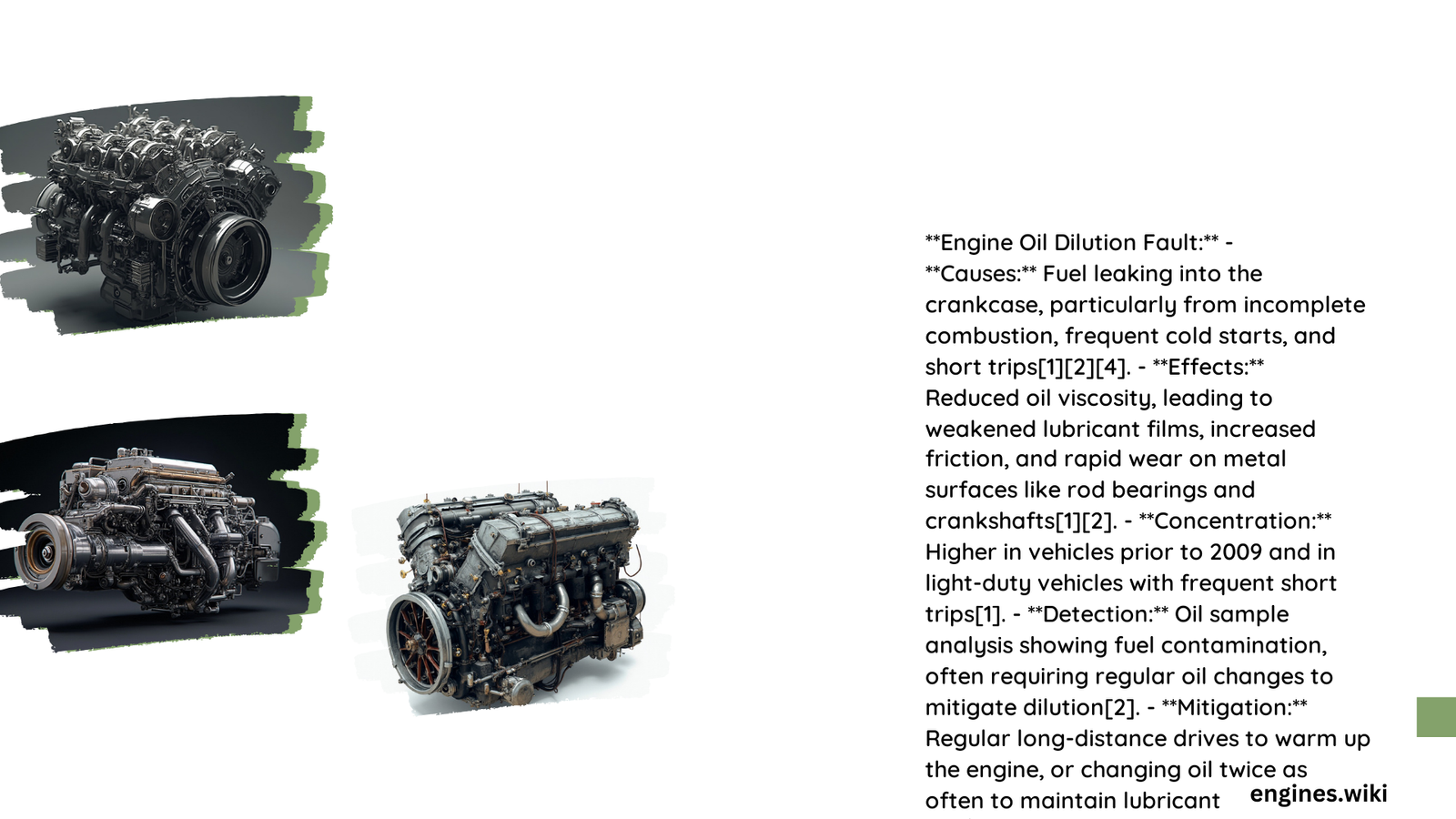Engine oil dilution fault is a serious issue that occurs when fuel mixes with engine oil, compromising its lubricating properties. This problem can lead to increased engine wear, reduced performance, and potential engine failure if left unchecked. Common causes include fuel system issues, driving conditions, and engine design factors. Symptoms range from changes in oil viscosity to fluctuations in oil levels and decreased engine performance.
What Causes Engine Oil Dilution Fault?
Engine oil dilution fault can be attributed to several factors:
- Fuel Contamination
- Leaking or dirty fuel injectors
- Worn piston rings
-
Excessive blow-by
-
Driving Conditions
- Frequent short trips
- Excessive idling
-
Low operating temperatures
-
Incomplete Combustion
- Cold starts
-
Short driving distances
-
Engine Design and Operation
- Post-injection during diesel engine regeneration
- Frequent transitions in hybrid vehicles
What Are the Symptoms of Engine Oil Dilution Fault?

Recognizing the symptoms of engine oil dilution fault is crucial for timely intervention:
Viscosity Changes
- Decreased oil viscosity
- Reduced lubricating film
Oil Level Fluctuations
- Unexpected increase in oil level
- Oil level rising above the maximum fill line
Engine Performance Issues
- Increased friction between metal surfaces
- Rapid wear of engine components
- Decreased overall engine performance
Additional Symptoms
- Fuel washing of cylinder walls and piston skirts
- Reduced concentration of protective oil additives
How to Diagnose Engine Oil Dilution Fault?
Proper diagnosis is essential for addressing engine oil dilution fault:
- Qualitative Methods
- Visual inspection of oil color and consistency
-
Smell test for fuel odor in oil
-
Quantitative Methods
- Kinematic viscosity tests
- Flash point tests
- Fourier-transform Infrared (FTIR) spectroscopy
What Is the Repair Process for Engine Oil Dilution Fault?
Addressing engine oil dilution fault involves several steps:
- Oil Change
- Increase frequency of oil changes
-
Use high-quality oil suitable for the engine
-
Software Updates
- Apply relevant Technical Service Bulletins (TSBs)
- Modify fuel injection strategies
-
Add oil heating functions based on driving patterns
-
Inspection and Repair of Fuel System Components
- Check and replace faulty fuel injectors
- Inspect and repair other fuel system components
| Repair Action | Estimated Cost | Timeframe |
|---|---|---|
| Oil Change | $50 – $150 | 30 minutes – 1 hour |
| Software Updates | $100 – $300 | 30 minutes – several hours |
| Fuel System Repair | $200 – $1,000+ | Few hours – full day |
How Does Engine Oil Dilution Fault Impact Vehicle Performance?
Engine oil dilution fault can significantly affect vehicle performance and longevity:
Engine Wear Rates
- Increased wear on critical components
- Reduced lifespan of bearings and crankshaft
Fuel Efficiency
- Potential decrease in fuel efficiency over time
- Increased fuel consumption due to engine inefficiency
Repair Costs
- If left untreated, can lead to severe engine damage
- Potential repair costs ranging from $2,000 to $10,000 or more
What Preventive Measures Can Reduce Engine Oil Dilution Fault?
To minimize the risk of engine oil dilution fault:
- Regular Maintenance
- Adhere to recommended oil change intervals
-
Use high-quality oil and filters
-
Driving Habits
- Avoid excessive short trips
-
Allow engine to reach operating temperature regularly
-
Fuel System Care
- Keep fuel injectors clean
-
Address any fuel system issues promptly
-
Monitor Oil Levels
- Check oil levels regularly
- Look for unexpected increases in oil volume
By understanding the causes, symptoms, and solutions for engine oil dilution fault, vehicle owners can take proactive steps to protect their engines and avoid costly repairs.
References:
1. Fuel Dilution – The Cause, Effect, and Detection – Savant Labs
2. FUEL DILUTION OF ENGINE OIL: CAUSES AND EFFECTS – TotalEnergies
3. Fuel Dilution Of Engine Oil In Plug-in Hybrid and Hybrid Tucsons – Hyundai Forums
